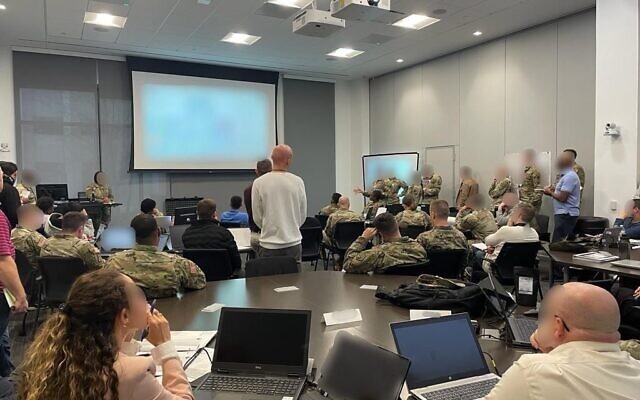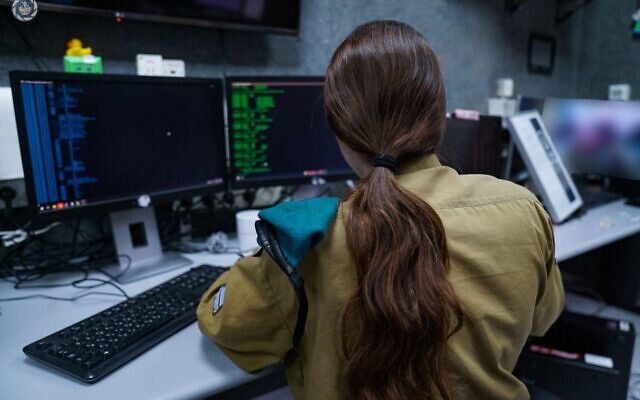IDF Cyber Defense unit holds drill with US Cyber Command
Joint exercise this week included training for ‘several real-world scenarios… with an emphasis on the Middle East,’ Israeli military says
Emanuel (Mannie) Fabian is The Times of Israel's military correspondent.

The Israeli military said Thursday that its s Joint Cyber Defense Division (JCDD) and the United States Cyber Command held a joint exercise over the past week.
The drill included training for “several real-world scenarios… with an emphasis on the Middle East,” the Israel Defense Forces said.
“The exercise is a continuation of the IDF JCDD’s close cooperation with USCYBERCOM and expresses the growing partnership between the US Armed Forces and the IDF in the cyber domain, which is reflected in joint and intensive operational activity in the various arenas,” the IDF added.
The JCDD, part of the IDF’s Computer Service Directorate, is a technological operational body that is in charge of providing the Israeli army and all of its systems with the defense it needs from cyberattacks.
The drill took place at the Georgia Cyber Center, in Augusta, Georgia, and is the seventh such joint exercise between the IDF and the US Cyber Command, the military said.
“Cyberspace is a combat dimension that has been developing at a significant pace in recent years. Cyberwarfare is an ongoing global phenomenon with a wide range of possible effects in various spheres,” said Maj. Gen. Eran Niv, head of the Computer Service Directorate.
“The exercise, which is neither the first nor the last, practically reflects the challenges we face in the cyber domain, which changes from year to year and presents us with strategic challenges,” said the commander of the JCDD, Brig. Gen. “Resh” — who can only be identified by the initial of his first name and rank due to security concerns.

In September, a senior IDF officer said the military had foiled dozens of attempted Iranian cyberattacks — mostly on Israeli civilian infrastructure — over the past year.
Israel and Iran have been engaged for years in a largely clandestine cyberwar that occasionally bubbles to the surface. Israeli officials accused Iran of attempting to hack Israel’s water system in 2020, while Iran has blamed Israel for cyberattacks on the country’s infrastructure.
The IDF believes that one of Iran’s main goals when it comes to cyberattacks is to instill fear within Israeli society. Therefore, Iran primarily targets civilian sites that do not necessarily cause damage to the military, but cause panic among the public.
Aside from the attempted attack on Israel’s water systems in 2020, a cyberattack in June thought to have been carried out by an Iranian group caused false rocket sirens to ring out in Jerusalem and Eilat.
Last year, a hospital in central Israel came under a major cyberattack, and its systems remained down for several days until military officials and other experts assisted in restoring its data.

The IDF says it has assessed that Iran has invested enormous resources into the development of offensive cyber capabilities.
At the same time, the IDF says it has invested its own resources into expanding its existing cyber defense capabilities, including holding routine drills with American counterparts at the United States Cyber Command.
Meanwhile, Iran has accused the United States and Israel of cyberattacks that have impaired the country’s infrastructure.
In June, an alleged Israeli cyberattack caused a large fire at a major Iranian steel plant. The attack was claimed by an anonymous group, but footage of the incident was published by Israeli TV, hinting that the operation had been carried out by Military Intelligence.
Iran disconnected much of its government infrastructure from the internet after the Stuxnet computer virus — widely believed to be a joint US-Israeli creation — disrupted thousands of Iranian centrifuges in the country’s nuclear sites in the late 2000s.
In a major incident last year, a cyberattack on Iran’s fuel distribution system paralyzed gas stations across the country, leading to long lines of angry motorists. The same anonymous hacking group, Gonjeshke Darande, claimed responsibility for the attack on fuel pumps.
Israel generally maintains a policy of ambiguity regarding its operations against Iran and does not disclose its responsibility for them.









